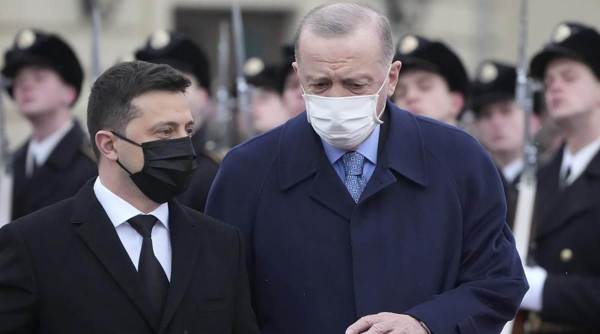
The foreign ministers of Ukraine and Russia are scheduled to meet for talks on the sidelines of the Antalya Diplomatic Forum in Turkey on Thursday. Turkish foreign minister Mevlut Cavusoglu has said the talks will be held in “trilateral format”: that is, with Turkey present in the room as a mediator.
Turkey has sought to mediate between Russia and Ukraine since the time tensions rose. “Upon President @RTErdogan’s initiatives and our intensive diplomatic efforts, Foreign Ministers Sergei Lavrov of Russia & Dmytro Kuleba of Ukraine have decided to meet with my participation on the margins of @AntalyaDF,” Cavusoglu tweeted.
Ukraine has not yet confirmed that it will attend. Irrespective of whether the meeting takes place and its outcome, Turkey’s interest in the crisis, particularly in playing the role of mediator, is of significance.
Turkey-Ukraine-Russia
Turkey, as the gateway between Europe and Asia, is a country of many parts. It is a member of NATO, and was at one time thought to be a natural fit for membership in the EU. But it is also increasingly a religious conservative state, whose authoritarian leader wants to turn the clock back to Islamism. Russia is a friend of Turkey but also an age-old geopolitical rival, going back to the Russo-Ottoman wars. For Turkey, Moscow’s annexation of Crimea has been a nagging concern; President Recep Tayyip Erdogan has said Turkey will never recognise this “illegal” action.
 Ukrainian President Volodymyr Zelenskyy in Kyiv last month. (AP)
Ukrainian President Volodymyr Zelenskyy in Kyiv last month. (AP)
Russia’s proximity to the PKK, the Turkish Kurdish rebel group, from the Soviet Union days is a major irritant for Turkey. In Syria, Russia and Turkey fought on opposite sides, Russia to preserve the Bashar al-Assad presidency, and Turkey on the side of groups fighting him. A side show was the Russia-Turkey battle for supremacy in the region, as it played out in the small territory of Idlib in north-western Syria on the border with Turkey.
Although Turkey was part of a western coalition against the Assad regime, it always saw the Syrian Democratic Force as an extension of the PKK, dominated as it was by the Syrian Kurdish YPG militia.

But Erdogan and Russian President Vladimir Putin overcame a particularly bad phase in the Moscow-Ankara relationship after Turkish forces shot down a Russian fighter plane. Russia is now among Turkey’s main trade partners. Turkey’s economy depends heavily on imports from Russia. In 2019, their bilateral trade was about $ 16.4 billion, and the biggest item imported from Russia was refined petroleum. There is a gas pipeline now under the Black Sea from Russia to Turkey. In 2020, Turkey bought the S 400 Triumf surface-to-air missile defence system from Russia, and was sanctioned by the United States under its CAATSA law. Russia is building a nuclear power plant in Ayukku in southern Turkey.
Turkey is also a close trading and strategic partner of Ukraine. Their bilateral trade in 2019 was about $ 2.15 billion, with Turkey a major exporter to Ukraine. The biggest export in 2019 was refined petroleum. Turkey also supplies Ukraine with a lethal missile carrier drone, which Ukraine has been using against Russian tanks during the current conflict.
In February, when matters were reaching a boiling point between Ukraine and Russia, Erdogan made a visit to Kyiv, and signed a Free Trade Agreement and an agreement to co-manufacture the armed long-range Bayrakthar drone in Ukraine. Russia has been angry with Turkey for arming Ukraine. Earlier, the West was angry with Turkey for supplying the drones to the Azerbaijan army during the Nagorno-Karabakh conflict, and several international companies that had been supplying drone parts and technologies to Turkey announced a boycott.
It appears that Turkey has indigenised the necessary parts for the drone. The company that makes the drones is owned by Erdogan’s son-in-law Selcuk Bayrakthar.
Turkey in the conflict
Turkey has described the Russian invasion of Ukraine as unacceptable and a blow to regional peace. It has rejected Russia’s recognition of the “republics” of Luhansk and Donetsk. It used the word ‘war’ five days after the invasion, and was one of the 80 sponsors of the General Assembly resolution titled “Russian Aggression in Ukraine”.
Turkey also invoked clauses of the 1936 Montreux Convention, a convention that put Turkey in charge of the Bosphorous and Dardanelles Straits, to bar the passage of warships through the Bosphorous Straits.
But Turkey has also said that under the terms of the convention, it cannot stop warships of the Black Sea littoral countries – Russia is one of them – from returning to their home base. Further, Erdogan has said Turkey cannot abandon ties with either Ukraine or Russia.
Foreign minister Cavusoglu has reiterated that Turkey cannot block all Russian warships accessing the Black Sea due to a clause in the pact exempting those returning to their registered base. “There should not be any abuse of this exemption. Ships that declare returning to their bases and passing through the straits should not be involved in the war,” he said.
In its efforts to mediate, Turkey is seeking to take on the role of the regional leader. It may also help Erdogan shed the his bad boy image in the West, where he is ranked alongside the authoritarian leaders of the world. Turkey has not joined the sanctions against Russia but after a meeting of NATO foreign ministers last week, Cavusoglu said Turkey and the US would remain in “close co-ordination” towards finding a diplomatic solution to the Ukraine war.
It is also seeking to protect its considerable economic interests in the region, the stability of the Black Sea and the Turkish straits, its defence relations with both countries, and its oil and gas supplies from Russia.
Newsletter | Click to get the day’s best explainers in your inbox